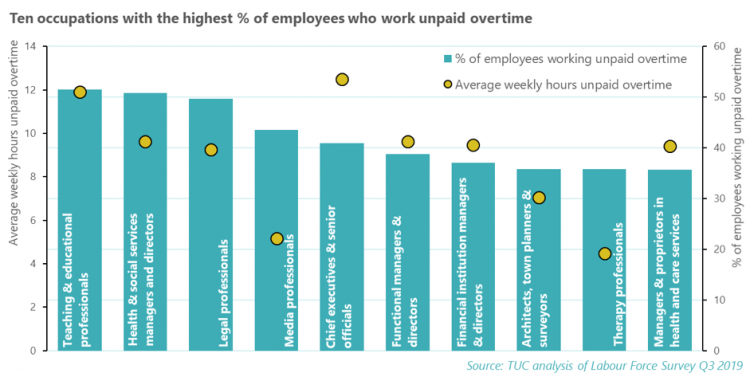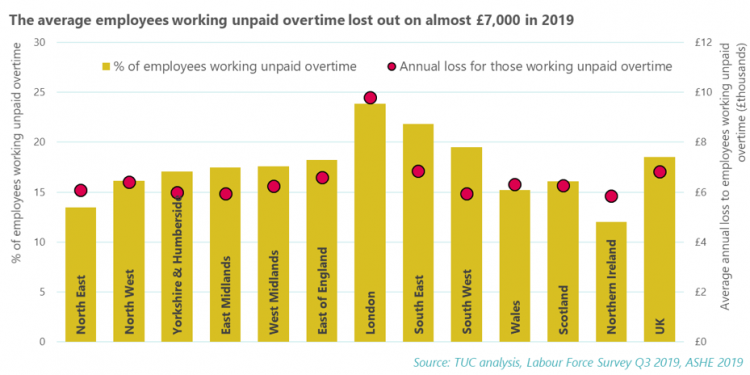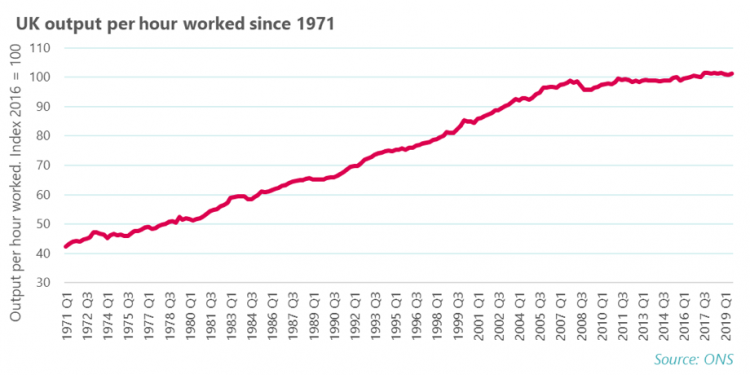
Work Your Proper Hours Day – let’s stop working for free
Today is the TUC’s 16th annual Work Your Proper Hours Day. For workers regularly doing unpaid overtime, today is effectively the first time in the year they’re getting paid.
In 2019, 5.1 million employees provided 39 million hours of unpaid overtime each week. This works out at a weekly average of 7.6 hours per person.
Millions of people working seven or eight hours unpaid overtime each week quickly adds up.
In total, employees put in a total of 2 billion hours of free work across the year.
The £35 billion in pay that employers save is great for them, but it has big financial and personal costs to the individual.
On average, those regularly putting in unpaid overtime in 2019 missed out on around £6,800.
They also lost around 8 hours each week they could have spent with friends, family, or doing anything other than work.
Which jobs are worst affected?
This affects some occupations more than others.
Teaching and education professionals are the most likely to be working unpaid overtime, with over half doing so.
They’re also working more unpaid overtime than average.
On average, teachers working unpaid overtime put in around 12 hours per week, compared to the average of 7.6.

On a broader level, those in the public sector are more likely to be working unpaid overtime than those in the private sector.
A quarter of public sector employees usually work at least an hour of unpaid overtime, compared to 16 per cent of those in the private sector.
There’s also a regional aspect to this, with those working in London and the South East more likely to be working unpaid overtime.
Nationally, around one in five employees work usually work an hour or more unpaid overtime each week. In London, that rises to one in four.

Long-hours culture
Problems with unpaid overtime are indicative of the UK’s long-hours culture.
Full-time employees in the UK usually work 42.6 hours per week on average – longer than any country in the European Union except Greece.
On top of this we have increasingly long commutes, with the average UK commute taking up almost an hour each day .
Yet this long-hours culture is not having a positive impact on productivity, which remains in a slump.
After decades of consistent growth, productivity since 2008 has been stagnant. By contrast, other European countries are putting in less hours but are more productive .

Time for change
It’s clear that our long-hours working culture needs to be addressed. Instead, we have a government that seems determined to make it worse.
The current cabinet is made up of ministers who have a history of pushing to scrap the Working Time Directive, which places a 48-hour limit on average weekly working time, as well as guaranteeing daily breaks, regular days off, and rest between working days.
As Britain begins trade negotiations with the EU, we’re calling for UK workers’ rights – including the Working Time Directive – to be protected in any deal.
Nobody should be removing our existing protections. Instead, we should be building upon them and aiming for a better work-life balance.
It’s time for a change in our working culture.
Long working hours cause stress, exhaustion and steal away time that could be spent with family and friends.
Other countries have shown that we can be just as, if not more, productive on less hours.
Alongside this, over the coming years, new technology will change our economy and how we work.
The benefits of this should be shared by working people, not just be used to make more profit for companies.
A shorter working week could help boost productivity and provide working people with their fair share of wealth.
The trade union movement has a long history of winning better working hours for workers. In the 21st century, it’s time to fight for a shorter working week with no loss of pay.
Stay Updated
Want to hear about our latest news and blogs?
Sign up now to get it straight to your inbox
